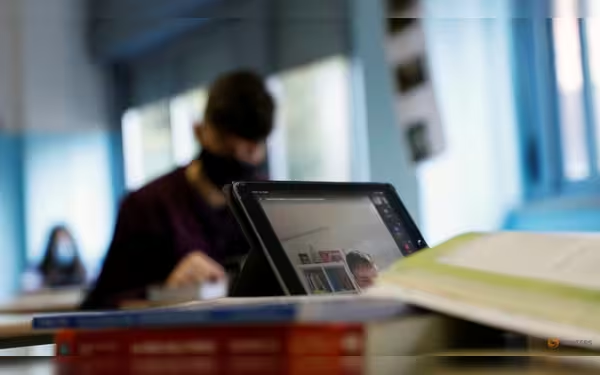Saturday, November 16, 2024 05:58 PM
Italy Launches AI Initiative to Enhance Digital Education
- Italy trials AI tools in 15 classrooms.
- Mobile phone ban implemented in schools.
- Education Minister emphasizes personalized learning.
 Image Credits: channelnewsasia
Image Credits: channelnewsasiaItaly introduces AI in schools to enhance digital education and bridge skills gap, while banning mobile phones in classrooms.
In a significant move to enhance digital education, Italy is set to introduce artificial intelligence (AI) in its schools. This initiative comes as part of Prime Minister Giorgia Meloni's government efforts to bridge the digital skills gap that exists between Italy and other European Union (EU) countries. The Italian Education Minister, Giuseppe Valditara, announced this week that AI-assisted software will be trialed in 15 classrooms across four regions, with plans to expand the program if the initial results are positive.
The AI tools, which will be available on classroom tablets and computers, are designed to serve as "virtual assistants". These tools aim to simplify the learning process for students and assist teachers in tailoring educational methods to meet individual student needs. Valditara emphasized the importance of this initiative during an interview with the TGcom24 news channel, highlighting the potential for a more personalized education experience.
According to Eurostat, Italy ranks poorly in basic digital skills among the 27 EU member states, only outperforming Latvia, Poland, Bulgaria, and Romania. Despite the promising nature of the initiative, specific details regarding the schools involved in the trial have not been disclosed. Valditara's office has yet to confirm which institutions will participate or elaborate on how the technology will be implemented.
Francesca Bastagli, head of research at the Fondazione Agnelli educational think tank, expressed optimism about the trial's evaluation, stating that it is "promising". She noted that the findings could provide valuable insights into what works and what is necessary for future AI tool rollouts in schools, ensuring they are both inclusive and effective.
In conjunction with this AI initiative, the Education Minister has also imposed a blanket ban on mobile phone usage in classrooms, even for educational purposes. This decision reflects a broader concern regarding distractions in the learning environment. Previous attempts to digitize Italian schools have faced challenges, particularly during the COVID-19 pandemic, largely due to the aging teaching workforce, with over half of educators being 50 years or older, as reported by the OECD.
Italy's push for AI in education aligns with the themes discussed at this year's G7 summit, which Italy hosted. In their final communique, world leaders committed to enhancing cooperation to harness the benefits of AI while managing its associated risks.
As Italy embarks on this journey to integrate AI into its educational framework, it raises important questions about the future of learning. Will these technological advancements truly enhance the educational experience, or will they create new challenges? Only time will tell, but the potential for a more tailored and effective learning environment is certainly an exciting prospect for students and educators alike.













